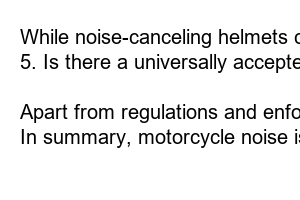오토바이 소음 신고
Motorcycle Noise Report: Battling Noise Pollution One Ride at a Time
Motorcycles are a thrilling way to experience the open road. The powerful engine and unbridled speed make for an exhilarating ride. However, the roar of a motorcycle engine can also contribute significantly to noise pollution. Motorcycle noise has become a growing concern in many cities around the world. In response to this issue, various initiatives have been implemented to regulate and reduce excessive motorcycle noise. This blog post will delve into the topic of motorcycle noise, its impact on the environment and communities, the measures taken to combat it, and how riders can contribute to a quieter, more harmonious riding experience.
1. The Environmental and Social Impact of Motorcycle Noise
Motorcycle noise can have detrimental effects on both the environment and communities. Excessive noise disrupts the natural habitats of wildlife, causing stress and disorientation. Additionally, noise pollution can harm human health, leading to increased stress levels, sleep disturbances, and other adverse health effects. Loud motorcycles can also disturb the peace and tranquility of residential areas, causing annoyance and frustration for those living nearby.
2. Government Regulations and Acoustic Standards
To combat motorcycle noise, governments have implemented regulations and acoustic standards. These regulations set maximum noise emission limits for motorcycles, ensuring they do not exceed a certain decibel level. Acoustic standards provide a framework for testing and certifying motorcycles’ noise levels before they are released to the market. These measures help manufacturers design and produce quieter motorcycles, reducing noise pollution.
3. Enforcement and Penalties
Enforcement plays a crucial role in reducing motorcycle noise. Authorities conduct regular checks to ensure motorcycles comply with noise regulations. Penalties, ranging from fines to impoundment, are imposed on riders who violate noise limits. Additionally, some cities employ noise monitoring technology to identify and apprehend noise offenders.
4. Noise Reduction Strategies for Riders
Riders can actively contribute to reducing motorcycle noise. Regular maintenance of motorcycles, including checking exhaust systems and mufflers, can help minimize excessive noise. Installing aftermarket mufflers specifically designed to reduce noise levels is also an option. Furthermore, adjusting riding practices, such as avoiding excessive acceleration and revving, can significantly reduce motorcycle noise.
5. Education and Awareness Campaigns
Education and awareness campaigns play a crucial role in addressing motorcycle noise. By educating riders about the impact of noise pollution and promoting responsible riding, these campaigns aim to foster a sense of social responsibility among riders. Promoting the use of earplugs and noise-canceling helmets is another effective measure to protect riders’ hearing and reduce noise.
6. Collaboration between Riders and Communities
To create a more harmonious relationship between riders and communities, it is essential to foster collaboration. Encouraging open dialogue between motorcycle enthusiasts and residents can lead to better understanding and cooperation. Organizing motorcycle events in designated areas can minimize the disturbance to residential neighborhoods while providing riders a platform to showcase their passion.
FAQs
1. Why are motorcycles louder than other vehicles?
Motorcycles often have less extensive noise-reducing equipment than cars or trucks. The design of their exhaust systems and engine components also contributes to the louder noise.
2. Can modifying the exhaust system make motorcycles quieter?
Yes, modifying the exhaust system by installing quieter mufflers can reduce motorcycle noise. However, it is important to ensure the modifications comply with local noise regulations.
3. How does motorcycle noise affect wildlife?
Loud motorcycle noise can disrupt the natural habitats of wildlife, causing stress, disorientation, and behavioral changes.
4. Can noise-canceling helmets eliminate motorcycle noise?
While noise-canceling helmets can reduce external noise, they may not completely eliminate motorcycle noise. They are designed to minimize repetitive low-frequency noise, such as wind noise, rather than engine noise.
5. Is there a universally accepted standard for measuring motorcycle noise?
Various countries and regions have their own noise measurement standards for motorcycles. These standards consider factors such as distance, speed, and engine RPM.
6. What initiatives are being taken to reduce motorcycle noise globally?
Apart from regulations and enforcement, initiatives such as noise barriers and acoustic materials for roads are being explored to minimize the impact of motorcycle noise on communities.
In summary, motorcycle noise is a significant issue that contributes to environmental degradation and community disturbances. However, with government regulations, enforcement, rider efforts, education campaigns, and collaboration between riders and communities, we can all work towards a quieter, more sustainable riding experience. Let us embrace responsible riding and reduce motorcycle noise for the benefit of all.

